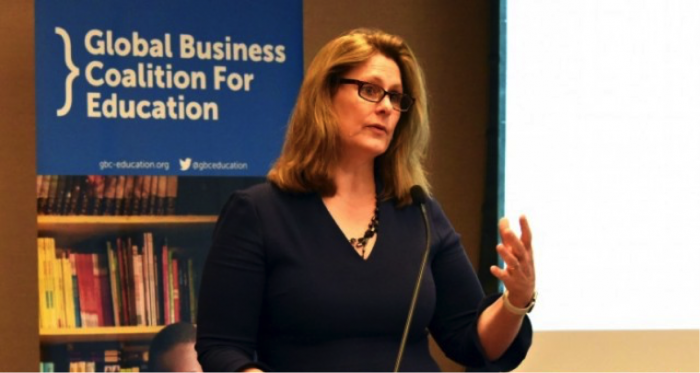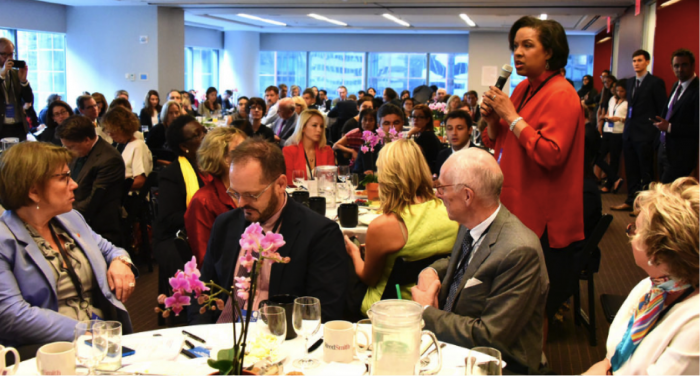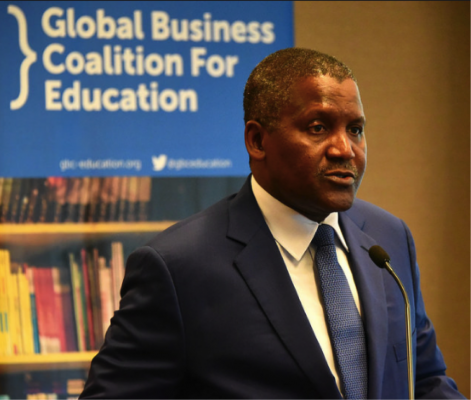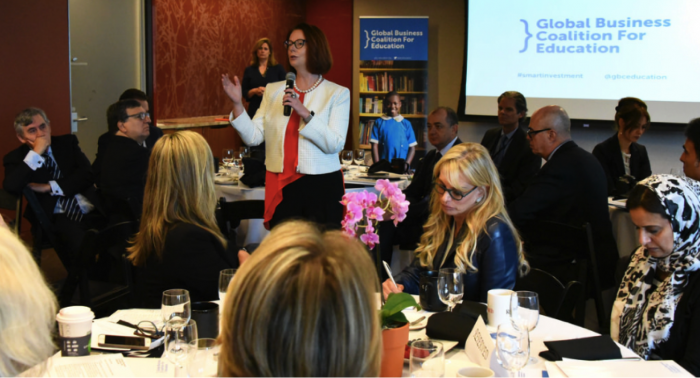GBC-Education’s Annual Breakfast: Innovative Responses to Education in Emergencies

Photo by Lana Wong/Education Commission
Wednesday morning, GBC-Education hosted its annual, high-level breakfast, Business Leads in Education: Driving Innovation and Partnership, during the 71st UN General Assembly to harness the collective impact from business, donor governments, UN agencies, charities, and more to address critical issues in global education.
With an increased focus on education in emergencies this past year, the event brought together changemakers from all sectors eager to share and discuss strategies on how to provide children and youth around the world with access to quality education, no matter their circumstance.
With the first year of the Sustainable Development Goals (SDGs) underway, “this has been a very important year for education,” but there remains much to be accomplished, particularly for children and youth in emergencies, said Executive Chair of GBC-Education Sarah Brown, setting the tone for dialogue among the many stakeholders in the room engaging in education in times of crisis.
UN Special Envoy for Global Education, Gordon Brown, expanded upon the dire need to continue efforts to provide quality education to millions of children and youth who are currently without it. Quoting findings from the Education Commission’s recent report, UN Special Envoy Brown warned that without adequate intervention, by 2030, 800 million of the 1.6 billion children of the world will leave their education without qualifications even approaching secondary school standards. Additionally, 400 million children will not even have primary qualifications. His message was clear: the private, public, and civil sectors must act — not just through funding, but through partnerships and collective impact.

Photo by Lana Wong/Education Commission
Following these galvanizing remarks, Coalition members shared how the private sector is engaging with global education, specifically in emergencies. Toni Townes-Whitley reiterated Microsoft Imagine Academy’s exciting new partnership with Pearson to deliver opportunities for 20,000 Syrians to learn and acquire globally-recognized certifications, allowing them to pursue in-demand jobs in the technology sector. Additionally, Microsoft has partnered with fellow Coalition member ITWORX Education to launch a pilot program at the Saad Nayel refugee camp in southwestern Syria to establish K-12 learning centers and develop volunteer teachers’ capabilities.
Denmark’s Minister of Foreign Affairs, Kristian Jensen, echoing UN Special Envoy Brown’s urgency, expressed the need to ensure that the world’s generation of youth – the largest that this planet has ever seen – become “fantastic agents of change.” Only through education can this be achieved, he emphasized. To put his words into action, Minister Jensen announced that Denmark would donate £10 million, or approximately $11.3 million, to the Education Cannot Wait Fund, a fund launched at the first ever World Humanitarian Summit in May that aims to provide 13.6 million children and youth living in emergencies and crises with quality education over the course of the next five years.
Other donor governments and world leaders shared Ministers Jensen’s commitment to equip children and youth with quality education, including Christos Stylianides, European Commissioner for Humanitarian Aid and Crisis for the European Commission (EC), who reported that the European Union (EU) is honoring its commitment to devote at least 4 percent of its humanitarian budget to education in emergencies, supporting at least 2.3 million children’s education. Next year, he stated, the EU will increase its support and allocate additional funds from its budget for education in emergencies, as it remains a critical issue.
Adding to the momentum of these exciting announcements, Gus Schmedlen from Coalition member HP presented its plan to open 6 HP learning studios for the Syrian refugees in Jordan and Lebanon. The studios will provide refugee children with the opportunity to learn literacy and numeracy by day, and, by night, will offer skills-based training to adults who have been displaced by the Syrian refugee crisis. HP has also created an algorithm that can predict the economic and social output 10 or 15 years in the future, and announced it would donate this code, open sourced, to GBC-Education.

Photo by Lana Wong/Education Commission
Aliko Dangote, Chairman and CEO of Dangote Group, a Coalition member company, helped to contextualize crises faced by children in other parts of the world, like northern Nigeria, where Boko Haram remains a threat, causing many schools to close. In response, Dangote Group has donated $5 million to support the reopening of schools and has partnered with the Gates Foundation to provide more than $100 million over the next few years for child malnutrition support in northern Nigeria.
Each of the aforementioned leaders, joined by more than 100 of their peers, demonstrate the power of the private and public sectors to develop meaningful and impactful partnerships to change the face of education for millions of children globally.

Photo by Lana Wong/Education Commission
Rounding out the event, Julia Gillard challenged participants, specifically those from the private sector, to think about strategy for advocacy and action for education in emergencies.
The door is open for business to make a true and lasting impact for education in emergencies. Will you join this effort?
Reach out to us at [email protected], and sign your business up for the Emergency Database.
